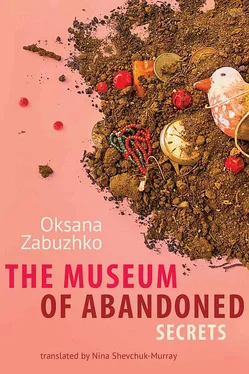And now she has it inside her.
Hello, then.
Everything happened of its own accord. Everything has been done for her—she has no say in it, no will of her own. Someone else’s will is at work, however—whose?—and all she has left to do was to obey it. Accept it. Lie under it.
She is a bit stunned with this new feeling—and at the same time, deep in her heart, strangely flattered: as if she’s been jerked forth from the ranks of indiscriminate figures lined up on a drilling field, pointed out by the commander in chief himself. On the other side of the field, a fire burns in a stove in the darkness, and the three Fates—Mom, Aunt Lyusya, and Grandma Tetyana—turn to look at her with the same expression on their faces: the serene, all-understanding, and unclouded look that is brought to women’s faces by the knowledge of the hardest and most important human work on earth. They turn, peer: Is she asleep? Awake? She’s awake already—come on then, come over here, to our side…
How many of them are out there, on the other side, disappearing into the darkness, no longer visible to her eyes? An army. An unseen, uncounted underground army, the most powerful in the world, one that pursues its war, silent and determined, over centuries and generations—and knows no defeat.
“Women won’t cease giving birth.” That’s what Adrian wrote down on the pack of cigarettes by the light of the lamp that night. Someone said this to him, in his dream. Someone told him to remember it. He wrote it down and wondered later what this might mean and why such an obvious truth should have appeared in such a near-death dream—a dream about war, to boot.
Here’s the answer. In her hand.
An army, yes. A second front. No, the other front—so much stronger than the first.
The two red (growing darker already) vertical lines on the test strip—this is her draft notice.
The only thing she can still do—the only thing still within her power and under her control—is to desert. This option is always available, with every draft. The black dot’s movement from the distant light at the end of the tunnel can be stopped; there is a way—she could blow up the tunnel.
Even a year ago that’s what she probably would have done, Daryna thinks, deeply moved, as if in response to events happening to someone else (“distanced” she involuntarily recalls hearing Adrian say, and this additional evidence of his presence inside her prompts another wave of warmth to fill her). Even six months ago, less than that—when was this?—yes, at Irka Mocherniuk’s birthday: the women sat in the kitchen, and Irka kept lighting up and then stubbing out her just-lit cigarette in alarm (“What am I thinking!”), smearing her mascara on her cheeks and telling them how she’s been trying to get pregnant with her new boyfriend, and how it’s not working, and how she madly, desperately wants to have another child; Igorchyk is a big boy already, and she just can’t help it—she’s got this urge to squeeze and kiss every baby in a stroller she sees in the street—the same eternal female talk around a fire, where each one chimes in with her own “and that’s how it was for me” by means of counsel, and everyone wants to hear it, the principle that was borrowed and then appropriated, without acknowledgement or credit, by Alcoholics Anonymous. And all of a sudden, they all ganged up on Daryna, like a flock of hens, pecking at her from every side: What about you, Sis, what are thinking, you’re thirty-nine already, don’t you know they automatically put every baby born after thirty in the high-risk group; you don’t live in Sweden in case you haven’t noticed, so what’s the matter, what are you waiting for, what do you mean “I don’t want to,” what do you mean you’re afraid? Everyone’s afraid and everyone pushes them out, you’re just stupid!
And she, backed into a corner, answered honestly and, to her own surprise, as clearly as if she’d been reading prepared text for the sound mixer, that her own survival cost too much for her to dare take on the responsibility for someone else’s. She remembered these words because after she spoke them, for a moment, there was silence, the girls went quiet. Not because they granted her point, Daryna sensed, but because this was a line from a different script. From a different front—whose existence they, of course, acknowledged, and which they were perfectly willing to treat with due respect, but which really, secretly, somewhere in their very heart of hearts, they did not take seriously: they knew something more important.
Even a year ago—yes, quite possibly. She’d have tortured herself for a couple days, wavered, cried—and then she’d have gone to get an abortion. Although back then she had, among other things, a secure job with a full benefits package. Now she has to fend for herself. And without any especially exhilarating prospects, truth be told. She ought to be pulling her hair out: Of all things, a baby’s not what I need right now! Forget me—hell knows what’s going to happen to this country in six months!
And yet, somehow, all this no longer seems important. Instead, it all feels exactly like lines from a different script.
This is important: She doesn’t have it in her to blow up the tunnel. This she knows for certain. The mere idea of it, detached and foreign, from a previous life, starts a drum beating under her skin and the wind howling in her ears, like bursts of machine-gun fire punctuated by explosions—Daryna shudders and looks at her arm: it’s covered in goose bumps. How strange that this is her arm. That these are her feet on the tile floor. That it is her thigh—so large—draped over by the shroud of her nightgown.
Her body, as her will, no longer belongs to her—it is no longer her . It ceased coinciding with her. It was meant for one more person, turns out, from the very beginning. A vessel. Ripened.
Because all this has already happened before—she has seen the tunnel explode. She saw it from inside, the way no ultrasound machine or any other contraption can show it. She and Adrian were shown this—no, only she was shown this that night, he did not see it—“The way you moaned… it scared me a little.”—“It really seemed a lot like dying.” No, even before that night, earlier, she was shown this right away, in the beginning, when she first glanced at the photograph in which a young woman in a rebel army uniform, squeezed between two men as between the millstones of fate she had chosen for herself, glowed at the camera with her otherworldly motherhood: a white flash like a thousand suns exploding at once or spotlights fired up in the dark of night—and the earth flies up in a towering black wave. And that’s it, the end. The tunnel is buried. No one will ever climb out.
Only the tapping from below—indistinct, uneven, going on for years, decades: someone wants to be heard, someone is not giving up, someone is calling to be let out…
I was wrong, Daryna thinks. All this time, the entire eighteen months (Is that how long it’s been already? That’s how long we’ve been together?) I believed that Gela called me to her death. But she didn’t—it was the death of her child.
That’s what was tormenting her.
But eighteen, or even twelve months ago, the then Daryna Goshchynska—a well-known journalist, the host of Diogenes’ Lantern , a successful self-made woman who posed for covers of women’s magazines and represented a status trophy for men who are driven around in company-owned Lexuses—would not have understood something like this. She had to change first.
They, the dead, helped her.
Over on the other side of the field, where the fire burns, the darkness begins to lift slowly, and behind the backs of her three Parcae, Daryna sees Gela. She sees the women of Adrian’s line—the ones she knows only from his family photos: Mom Stefania (this is the first time Daryna addresses her that way, in her mind—up until now she was always Aidy’s mom) and Granny Lina and Great-Grandmother Volodymyra, Mrs. Dovgan, and some other ladies, from the ’30s, ’20s, teens, the beginning of the past century, with little cloche hats pulled down over their eyebrows, silk bands, tall laced boots—of course, they are all related to the one who is inside her, he or she is theirs, too, their blood; they have a claim—and they mix in with my Grandma Tetyana and Aunt Lyusya, as if for a wedding photo together.
Читать дальше












